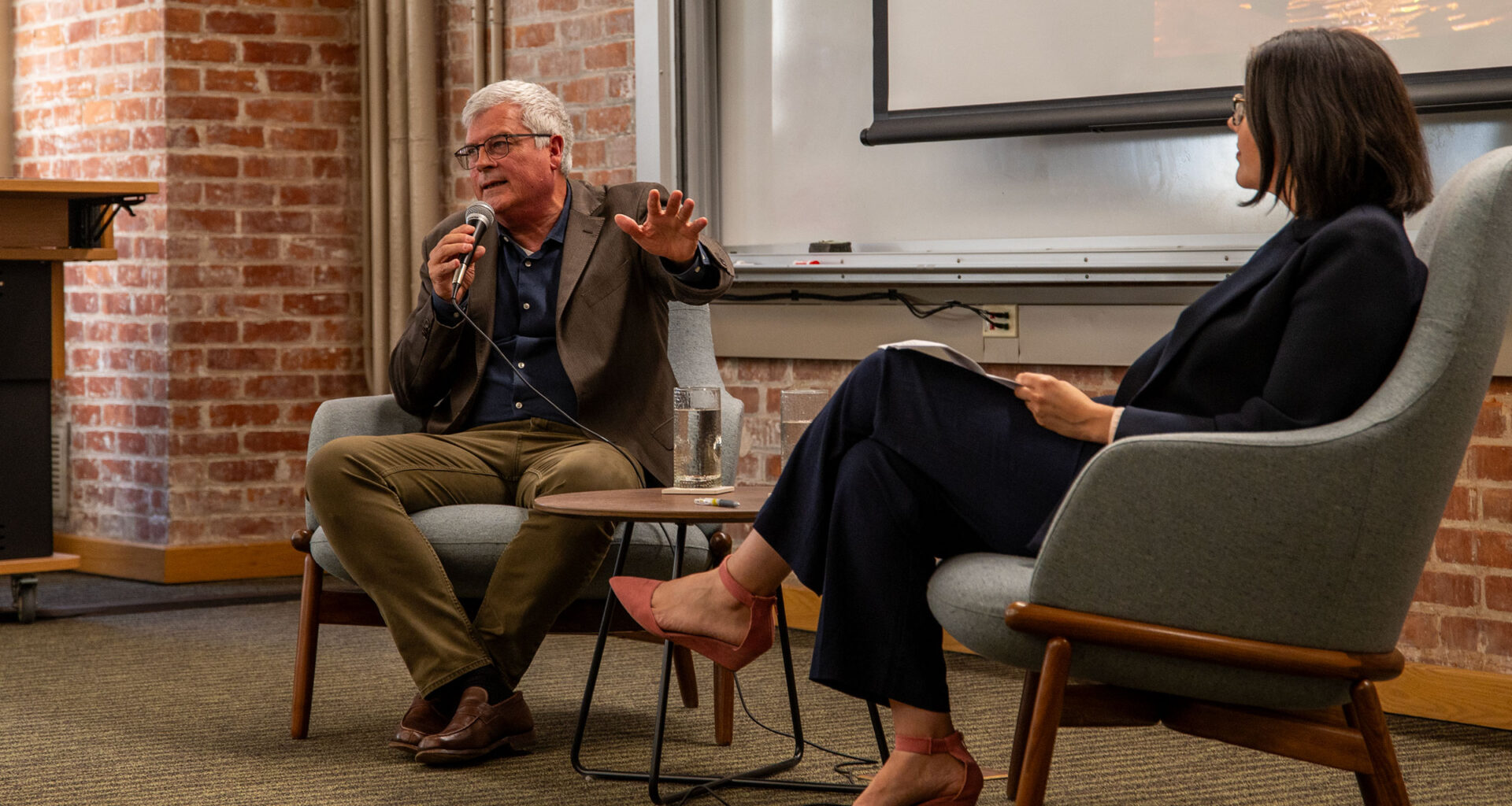The University of Michigan’s School for Environment and Sustainability and the William Davidson Institute hosted a discussion by Bill Spindle, energy transition and global climate correspondent, on his career reporting as an environmental journalist across the world Wednesday afternoon. A part of the University’s first annual Climate Week, the event highlighted the intersection of journalism, global politics and the challenges of a transition to clean energy.
Spindle, who graduated from the University with a degree in English literature, has reported on climate politics for decades. Previously, he worked as a reporter and The Wall Street Journal’s bureau chief for countries in the Middle East, Asia and Africa, where he covered topics including India’s water crisis and the United Nations climate conferences. Spindle currently works as an independent journalist.
At the beginning of the event, Spindle said while the process of fighting climate change is difficult, he believes pathways will continue to open for the U.S. to develop sustainable energy practices.
“How are we going to grow the energy system, meet all this demand, do all these things we want and, at the same time, get the carbon emissions under control and then begin pushing them forward?” Spindle said. “The good news is there’s lots more tools, and I think there are a lot of new routes to getting there that didn’t really exist before. And I do think that, although it’s been a frustrating time for many in the climate space, in particular in the U.S., I do think there are new pathways that are opening up.”
Spindle also spoke about his reporting on India’s energy transition through his travel with the International Affairs Fellowship. Spindle said during his reporting, he wrote about the challenges for India as it transitions away from coal and into an almost 100% electrified system.
“When coal starts going down, the Indian railway is still going to have a challenge because its single largest and most profitable freight class is coal,” Spindle said. “It’s now going to have to restructure its budget, but that can be tricky because all of these profits from coal go to financing subsidized tickets for regular Indians so they can ride the train for virtually free. The economy functions on that — they all need those tickets. You also can’t easily lay off people.”
Spindle said developing countries face unique challenges in adopting clean energy.
“I think that’s the dilemma that most of the developing world is really in,” Spindle said. “How do you make an energy transition that requires quite a lot of resources up front, even though the payoff comes later? At the same time, the longer that gets delayed, the harder it is to get those funds and make those investments, (and) the more you’re exposed to the effects of climate change.”
Spindle described the ways uneven adoption of clean energy technologies has reshaped national economies, particularly in places where it is difficult for utilities to adapt quickly. He said Pakistan has seen a large amount of solar panels imported into the country.
“You basically got anybody who can afford solar panels buying solar panels, sticking them everywhere they can stick them — on their roofs, on their balconies, on their front lawn,” Smith said. “And then basically no longer using any energy from the grid, which has left the country’s utility — which was not in great shape in the first place — in just a horrible state. And one of the problems it’s causing is that the poorest of the poor who can’t afford solar panels in the front yard or on the roof are facing higher electrical bills.”
Spindle said clean energy solutions are still in the early stages of development, despite rapid progress.
“I’d say one of the biggest revelations I’ve had is that really things that we think of as somewhat mature clean energy technologies — solar panels, wind, certainly batteries — they’re doing really well,” Spindle said. “But when you start to talk to the people in these industries, you realize that there’s so much more that’s going to happen in just the technological breakthroughs in solar, for example.”
In an interview with The Michigan Daily, Rackham student Stephanie Smith, an event attendee, said she learned the U.S. is falling behind in sustainable development.
“I think my biggest takeaway was just that the United States is continuing to fall behind globally, especially in terms of electric vehicles, but generally in our sustainable energy transition,” Smith said. “Even developing countries around the world are going to push ahead with implementing these technologies, but they won’t be from companies that come from in the United States. It’s interesting to hear perspectives that confirm that from someone who’s been a correspondent outside of the U.S.”
Following Spindle’s talk, the William Davidson Institute hosted a happy hour allowing students, researchers and alumni to further connect over energy and climate reporting. Caitlin Jacobs, LSA sustainability program manager, told The Daily she was excited to see how U-M alumni have applied themselves across the world.
“I work in LSA, Bill is an LSA alumni, and so that was one reason I was really interested to be here,” Jacobs said. “It’s just always exciting for me to see where students with different backgrounds can wind up.”
Daily Staff Reporter Ava Pustulka can be reached at apustulk@umich.edu. Daily News Contributors Alexa Cheaney and Sonia Alizadeh contributed to reporting.
Related articles
